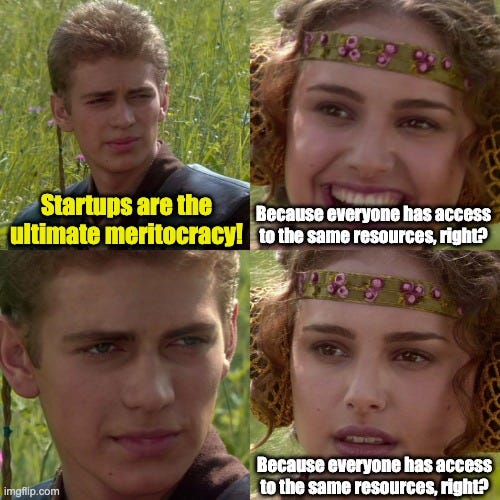My co-founder Hattie Willis and I are building IfWeRaise, a new platform aimed at helping underserved founders fundraise through focused collaboration with experienced angel investors.
Here I wanted to unpack a problem that we’ve seen in the UK’s early stage ecosystem and explain why we think this solution might contribute to helping fix it. We’re very much working in the open -feedback and constructive criticism are gratefully received.
tl; dr
Who gets to found startups matters
The startup ecosystem is full of dramatic launches and headlines about the latest fundraising rounds. But more importantly, it shapes our society - how we live, work and play.
Startups have a huge impact on their customers, employees, suppliers and the communities they serve. And, of course, the potential to create life changing wealth for a founder, their family and their investors.
So if startups matter to everyone, then who gets to build startups matters to everyone. And beyond the impact on society, the opportunity for founders and investors to create personal wealth plays an important role in correcting (or exacerbating) historic socio-economic inequalities.
Access to money matters 💸 💸 💸
Many high growth startups require outside capital to be invested to pay for a team, marketing, overheads and a salary for the founders. A few founders will have the personal financial resources to effectively work for free at this stage but most will need an income to live on.
Early stage capital typically comes from angel investors or early stage venture capital funds. With a vested interest in the startup’s success these investors also often act as advisors to founders, providing free advice and support.
These early stage investors are typically either successful ex-founders themselves, wealthy individuals or professional investors investing money on behalf of their clients from a fund.
But it's more than money 📓🕸️📚
Some founders will already have experienced investors in their personal network. These investors will be family members, university friends, founders of startups they’ve worked for or friends in the financial services sector.
And the benefit of this network isn’t just potential investment. Their personal network will give them a wider network with crucial introductions to a key first customer or employee, informal sales and marketing advice or backdoor access to speak at key industry events.
Beyond capital and network is access to unwritten, informal knowledge. Knowledge of the hidden jargon, norms and practices of the startup ecosystem - what fair deal terms are, current market startup valuations or how to frame a business attractively to an investor. Impossible to figure out without an insider.
Capital, network, knowledge - your access to each of these makes a critical difference to your likelihood of success.
Talent is equally distributed but opportunity is not
Leslie Cornfeld
If our goal is fairness then we want the best founders with the best ideas to have access to resources - not just the founders who happen to be closest to those resources.
The easiest resource to understand the current state of affairs is the most tangible - investment of capital. Humour me and let’s assume that access to network and knowledge correlate with allocation of investment, on the basis that these resources are likely to come via relationships with investors.
Capital invested in UK startups:
By gender
• 11% went to those with one or more female co-founders
• 1% to all female founding teams (who are 51% of UK population)
By ethnicity
• 0.24% of funding went to black founders (who are 3% of UK population)
• 1.58% of funding went to all ethnic founding teams (who are 14% of UK population)
By socio-economic background
• 42.72% went to founding teams with at least one member from an elite educational background (who make up less than 1% of UK population)
Data from Extend.vc - Diversity beyond Gender
This leaves underserved founders stuck
If you can’t raise investment for your startup then you are stuck. Stuck in two ways in fact. The first is obvious, you don’t have the capital to spend on product, marketing and team.
But you also don’t have access to the invaluable knowledge and network to develop your business. It’s precisely the knowledge and network that these advisor investors have that will help you move forward and become more investment ready. But they haven't invested.
The Kaufmann Foundation’s research documents the benefit beyond just capital that angel investors provide, showing a 20% increase in survival rates after four years.
You can help break the deadlock
The IfWeRaise mechanism is simple but powerful. Our community facilitates high value collaboration between underserved founders and the angel investors who hold the knowledge, network and capital.
It relies on the support of angel investors who know that the current system is unfair and want to give high potential founders a fair chance.
Value proposition to angels
An easy way to help be part of the solution, not the problem
Network and learn from other angel investors
Unique deal flow of startups who are backed by a powerful community
Value proposition to founders
An informal advisory board to help you move faster
Record and share your progress, gain investor relations skills
Broaden your network and gain support from other founders
Informal advisory board, structured process
The angel investors act as angel advisors. There is no obligation or expectation that they will invest - they are there to help the startup move forward as quickly as possible. But of course the goal is that the startup becomes an attractive investment for funds, our angel advisors or their wider network.
The IfWeRaise process emulates that of a well run startup advisory board. Structured updates on progress each month from the founder, with an efficient way for angel advisors to feedback and offer support. And the peer support of the other startups in the community.
Our initial community is a cohort of ten startups with five experienced angel investors helping them move forward.
What next?
😇 Angel investors - join to support high potential underserved founders
🚀 Underserved founders - how our community can support you
🔗 Partners - do you run an angel syndicate, fund or group? Get in touch
➡️ Follow IfWeRaise on LinkedIn or sign up to our newsletter in the footer



